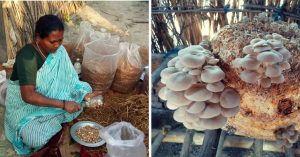TBI Blogs: Meet ‘Lady Wi-Fi’ and Other Super Inspiring Women of Rajasthan’s Sahariya Tribe
Women of the Sahariya tribe in Rajasthan are making a mark for themselves and, in the process, enabling access to a better livelihood for others in their community.
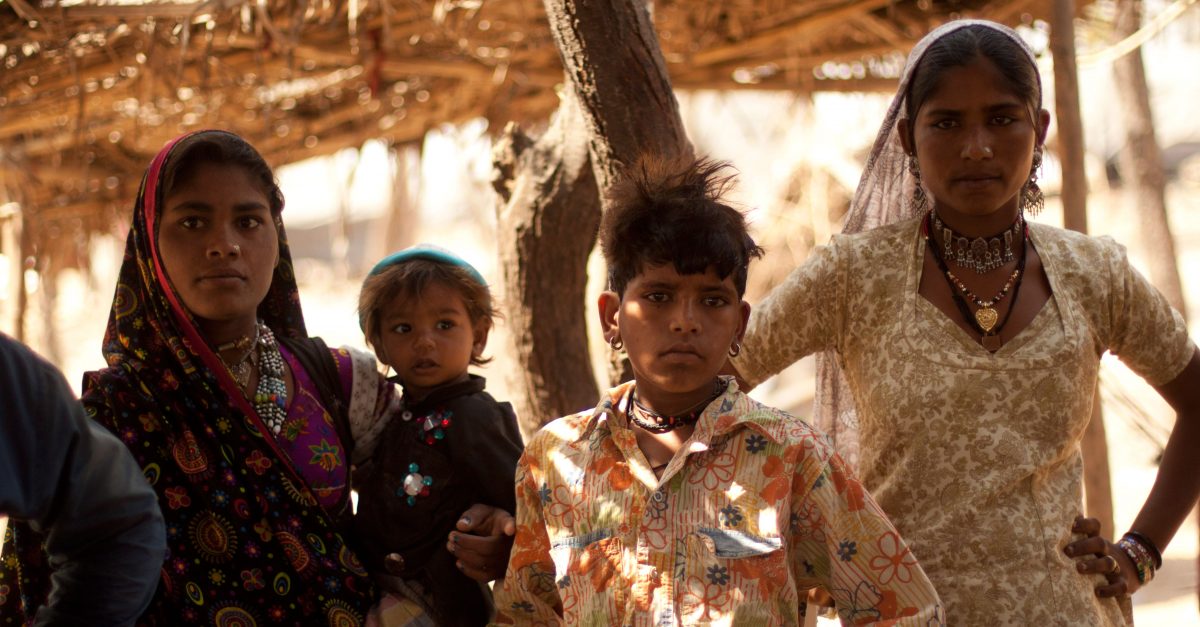
Women of the Sahariya tribe in Rajasthan are making a mark for themselves and, in the process, enabling access to a better livelihood for others in their community.
In Hindu mythology, it is believed that Lord Brahma, while carving out the universe, reserved the central space for the Sahariya Tribe. In the rush and greed to occupy the central position, however, others pushed the Sahariya far away into the periphery. A disappointed Brahma cursed the Sahariya for their incapability to maintain their position, and abandoned them in the jungles. This Brahminical myth is perhaps designed to give a divine sanction to the plight of the Sahariya. Since the birth of the universe, very little seems to have changed in the lives of the Sahariya community.
The Sahariya Tribe, one of the most backward and sidelined tribes in the country, resides in Baran district, along the south-eastern border of Rajasthan and Madhya Pradesh. Deprived of education, health facilities, and economic opportunities, this community was forced to surrender to bonded labour and meager wages decades ago.
Many continue to be trampled by this system every day even today.
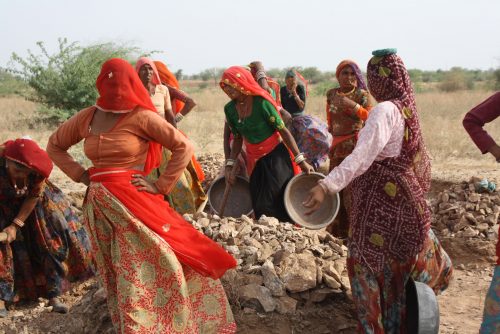
Travelling across Baran district, one will come across heartbreaking stories of families who were enslaved to the whims of their money lenders, unable to break free for generations. Mamta Bai, mother of three young girls and wife of a disabled man, can often be seen crying hysterically because of helplessness and hunger. 12-year-old Aakash works day and night with his father, trying to pay off their family debt by labouring for extra hours. Children like Aakash have never seen the insides of a school, but bear the burden of responsibility from a very young age. The curse of bonded labour remains a reality of India even in 2016, with an estimated 13-14 million people enslaved in some form of modern slavery.
While no one can deny or disregard the sufferings of the tribe, there are some, especially women, who have found a way to fight for their community. Their stories reflect a silver lining for the tribe and many others like them.
Gyarishi Devi is an activist of the Sahariya tribe who is over 50 years of age. A founding member of the Jagrut Mahila Sangathan (JMS), Gyarishi Devi has been fighting the problem of bonded labour and overall backwardness of the tribe in Baran district for more than a decade now.
The organisation that had just 250 members in 2002 today boasts a 1,500-strong army.
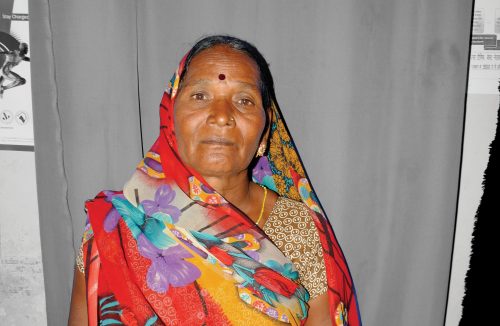
One of the major reasons for this is that now even those not in close geographical proximity to the Sangathan’s office can access the group, and avail support or any kind of aid through it. Gyarishi Devi and her organisation feel strengthened today because video conferencing has made it possible for women in different parts of the district to get together and raise their problems. People no longer need to travel long distances for a meeting. They can simply visit one of the 10 Community Information Resource Centres (CIRC) in the district and connect with JMS.
“Internet connectivity has enabled us to communicate with people easily and spread our message. We have also become much more empowered as we can now access information on our rights and government schemes/entitlements almost on-the-go by simply going online,” Gyarishi Devi asserts.
Reena Sahariya is another woman from the community who is an inspiration for both the women and men of her community. She was 30 years old when she became the first woman sarpanch of her village, and also the first woman from her community to ever stand for elections.
A mother of two children, Reena’s family and community celebrate her for her achievements.
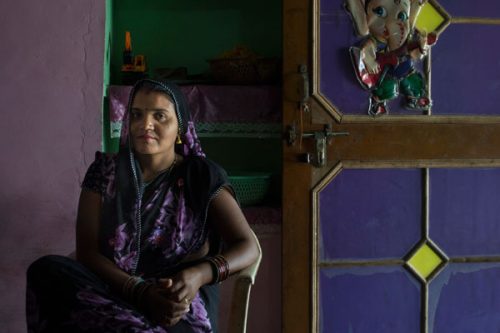
Before she became a sarpanch, Reena was an extremely quiet and shy person. So, her initiatives and stand to ensure quality health and sanitation, better road connectivity, and availability of clean drinking water surprised everyone even more. During her tenure, Reena installed six motor water pumps, set up multiple anganwadi centres, laid down cemented roads, built homes for 300 underprivileged families, and extended education in schools from Class VIII upto Class X. The forward-thinking leader also had the vision to install solar street lighting infrastructure.
Then there is another young lady in the community who shares her name with Reena, the former sarpanch. This 22-year-old Reena Sahariya enrolled for digital literacy classes in 2011, two years after Class XII. Today, she trains other children at a CIRC in Mamoni village, Baran district.
This young lady now aspires to learn photography and Photoshop to build a career in that field.
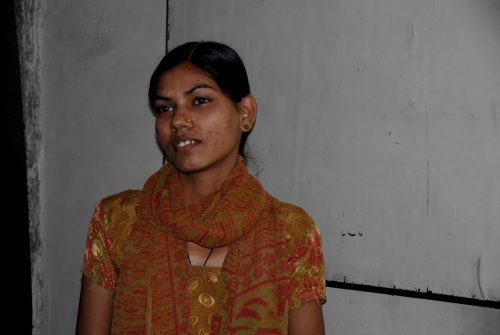
Rajkumari is 28 years old. Though she could attend school only till Class X, she’s still eager to learn. Today, villagers in Khandela village of Baran district call her “Lady Wi-Fi” because of her knowledge of wireless engineering. She’s also enthusiastically connecting households to wireless broadband connectivity (with help from Digital Empowerment Foundation’s Wireless for Communities project). Born a Sahariya, Rajkumari wears many feathers in her cap. She holds the tag of Lady Wi-Fi, and teaches children computers and science at a community school.
She also edits a local tribal newspaper called Khoj Khabar.
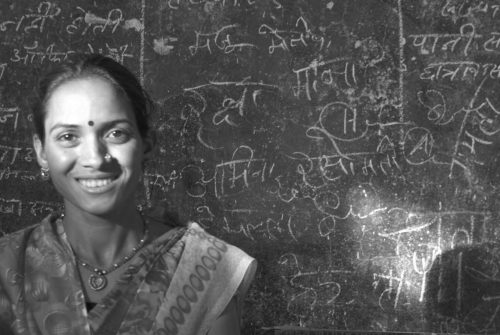
These women may be a drop in the ocean, but every drop is an ocean in itself.
Sankalp Sansthan, a non-profit organisation fighting discrimination, has been working for the last 30 years for Baran’s Sahariya community. The organisation is trying to provide them with land entitlements and social welfare schemes. With its larger aim to educate the community, the organisation has tied up with the Digital Empowerment Foundation (DEF). Together, they provide digital literacy and access to online portals to address grievances and avail government schemes and entitlements.
(About the authors: Udita Chaturvedi is part of the Media & Communications team of DEF. She enjoys writing stories of impact in the areas of education, children, health, and women. You can reach her at @uditachaturvedi. Sharada Kerkar is part of the CIRC project team of DEF, and finds passion in working with children. You can reach her at @SharadaKerkar.)
Help DEF make digital tools and devices available to marginalised Indian populations by donating your old devices, here.
Images sourced from Vimages.
Like this story? Or have something to share? Write to us: [email protected], or connect with us on Facebook and Twitter.
NEW: Click here to get positive news on WhatsApp!
This story made me
- 97
- 121
- 89
- 167
Tell Us More
We bring stories straight from the heart of India, to inspire millions and create a wave of impact. Our positive movement is growing bigger everyday, and we would love for you to join it.
Please contribute whatever you can, every little penny helps our team in bringing you more stories that support dreams and spread hope.






